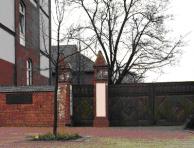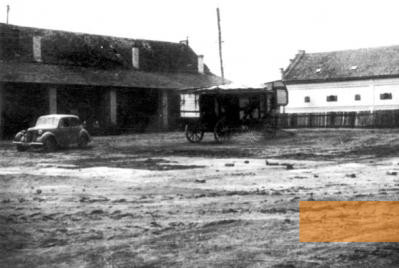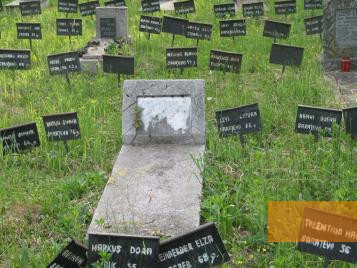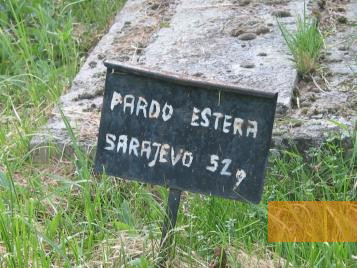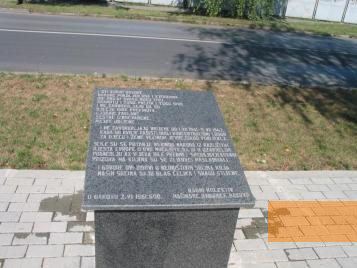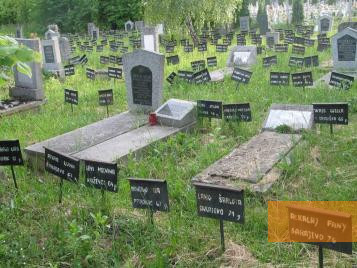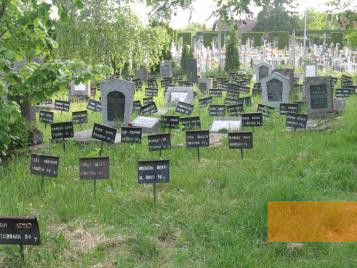569 victims of the Ustaša, mostly women and children, were buried on a camp cemetery in the small town of Đakovo. Between 1941 and 1942, several thousand women and children were incarcerated by members of the Ustaša in the Đakovo camp and subsequently deported.
The small town of Đakovo lies in the north of Croatia, in the historical region of Slavonia. After the invasion of Yugoslavia by the German army and its allies in the spring of 1941, the occupiers divided the country: The fascist Ustaša movement proclaimed the Independent State of Croatia (Croatian: Nezavisna Država Hrvatska)in the area that today covers Croatia and Bosnia-Herzegovina. Soon, the new regime established camps all over the country, mainly for incarcerating Serbs, Jews and Roma. Many of these prisoners were later murdered.
In December 1941, the Ustaša set up a camp for women and children on the premises of a mill in Đakovo. The Jewish community of Osijek was responsible for administering the camp, it had to maintain the camp buildings and supply provisions. Until March 1942, the situation of the women in the camp remained bearable: some were allowed to leave the camp to visit relatives or obtain supplies, and there was enough food. In March 1942, the Ustaša decided to transfer over 1,100 women who were ill with typhus from the camp at Stara Gradiška to Đakovo. That same month, the Ustaša took over the administration of the camp. Illnesses quickly spread, and the number of inmates rose to 3,000. The Ustaša guards tortured and abused the women. In mid-June, the dismantlement of the camp was begun due to the many ill inmates. The approximately 3,000 women and children were deported to the Jasenovac death camp.
In December 1941, the Ustaša set up a camp for women and children on the premises of a mill in Đakovo. The Jewish community of Osijek was responsible for administering the camp, it had to maintain the camp buildings and supply provisions. Until March 1942, the situation of the women in the camp remained bearable: some were allowed to leave the camp to visit relatives or obtain supplies, and there was enough food. In March 1942, the Ustaša decided to transfer over 1,100 women who were ill with typhus from the camp at Stara Gradiška to Đakovo. That same month, the Ustaša took over the administration of the camp. Illnesses quickly spread, and the number of inmates rose to 3,000. The Ustaša guards tortured and abused the women. In mid-June, the dismantlement of the camp was begun due to the many ill inmates. The approximately 3,000 women and children were deported to the Jasenovac death camp.
The Ustaša mainly held women and children captive at the Đakovo camp. It is not known exactly how many people passed through the camp. After the camp's dissolution, the Ustaša deported about 3,000 women and children to the Jasenovac death camp. Their further fate is not known – they were most probably murdered. The Đakovo camp itself also claimed many lives: 569 women and children who died of hunger, illnesses and abuse are known by name. They were buried on-site. The actual number of victims of the Đakovo could in fact be much higher.
The remains of the victims of the Đakovo camp were buried on the municipal Jewish cemetery. They were buried in individual graves already in 1942. Each one of the 569 graves bears a metal sign with the victim's name. In 1952, the Jewish community erected a memorial to the victims of the camp in the funeral parlour of the Jewish cemetery. This room is currently sealed. In 1990, a memorial plaque, which was set up on the former camp premises in 1961, was removed. It was later reinstated.
- Name
- Židovsko Groblje Đakovo
- Address
-
Ulica Vladimira Nazora 10
31400 Đakovo - Open
- The cemetery is open from 8 a.m. to 6 p.m. The memorial plaque is always accessible.
